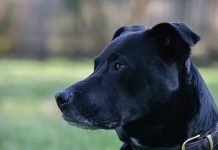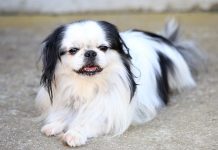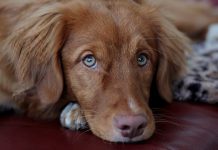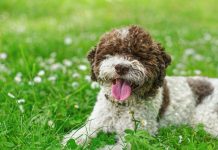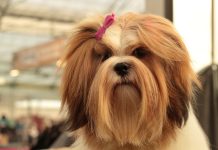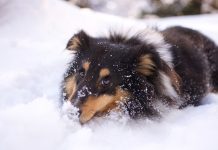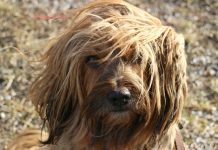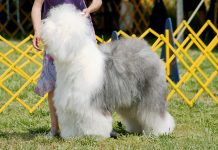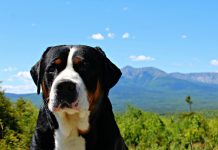History and Origins of the Irish Wolfhound Breed

The history of the Irish Wolfhound dates back thousands of years, making it one of the oldest breeds of dogs known to man. This noble breed originated in Ireland, where it was highly esteemed for its hunting prowess and revered as a symbol of status and nobility.
The Irish Wolfhound’s primary historical role was hunting wolves, elk, and other large game, as well as serving as a guardian and protector of homesteads and livestock. The breed’s name reflects its original purpose of hunting wolves, with “wolfhound” denoting its ability to hunt and tackle these formidable predators.
Irish Wolfhounds were favored by Irish chieftains and nobility for their strength, courage, and loyalty. They played a significant role in ancient Irish society and were prized gifts presented to foreign kings and dignitaries.
Over time, the Irish Wolfhound faced a decline in population due to changes in hunting practices and the diminishing numbers of wolves in Ireland. By the 19th century, the breed was nearly extinct. However, efforts to revive and preserve the Irish Wolfhound were successful, and it was recognized as a distinct breed with a standard in the late 19th century.
Today, the Irish Wolfhound is cherished worldwide for its gentle temperament, noble appearance, and companionable nature. While no longer used for hunting wolves, the breed remains a beloved family companion and ambassador of Irish heritage.
Physical Characteristics and Appearance of Irish Wolfhounds
The Irish Wolfhound is a giant breed with a commanding presence and graceful demeanor. Here are the key physical characteristics and appearance traits of the Irish Wolfhound:
- Size: Irish Wolfhounds are one of the tallest dog breeds, with males typically standing at least 32 inches (81 cm) or more at the shoulder. Females are slightly smaller but still impressively large. They are lean and muscular, with a powerful build.
- Weight: Adult Irish Wolfhounds can weigh between 140 to 180 pounds (63 to 82 kg) or more, depending on the individual and gender.
- Coat: The Irish Wolfhound has a rough and wiry coat that provides protection from the elements. The coat comes in various colors, including gray, brindle, red, black, white, fawn, and combinations of these colors. Regular grooming is necessary to maintain the coat’s health and appearance.
- Head: The breed’s head is long and narrow, with a slightly arched skull and a prominent stop. Irish Wolfhounds have a keen and intelligent expression, with dark eyes that convey gentleness and intelligence.
- Ears: The ears of Irish Wolfhounds are small and rose-shaped, folding back against the head when relaxed.
- Tail: The tail is long and carried low, with a slight upward curve at the end.
- Gait: Irish Wolfhounds have a smooth and efficient gait, covering ground effortlessly with long strides.
- Temperament: Despite their imposing size, Irish Wolfhounds are gentle giants known for their calm and friendly demeanor. They are affectionate, loyal, and good-natured, making them excellent companions for families and individuals alike.
- Exercise Needs: While Irish Wolfhounds are not overly active, they require regular exercise to stay healthy and fit. Daily walks and opportunities to stretch their legs in a securely fenced area are essential.
- Lifespan: The average lifespan of an Irish Wolfhound is around 6 to 8 years, which is relatively shorter compared to smaller breeds. Proper nutrition, veterinary care, and attention to their unique needs can help maximize their lifespan and quality of life.
Irish Wolfhounds are a captivating breed with a rich history and gentle spirit. Their imposing yet gentle nature makes them cherished companions and loyal family members. Understanding their history and physical characteristics can deepen appreciation for this remarkable breed and guide responsible ownership.
Irish Wolfhound Temperament and Personality Traits
- Gentle and Affectionate: Irish Wolfhounds are known for their gentle and affectionate nature. They form strong bonds with their families and are often referred to as “gentle giants” due to their patient and kind disposition.
- Loyal and Devoted: Irish Wolfhounds are fiercely loyal to their families and thrive on companionship. They enjoy being close to their loved ones and make excellent family dogs.
- Good-Natured and Even-Tempered: This breed is typically good-natured and even-tempered. They are rarely aggressive and are known to be tolerant and patient, especially with children.
- Reserved with Strangers: While Irish Wolfhounds are friendly, they can be reserved around strangers. They are not typically aggressive but may appear aloof until properly introduced.
- Calm Demeanor: Despite their size, Irish Wolfhounds have a calm demeanor. They are not overly excitable or hyperactive, preferring a laid-back approach to life.
- Alert and Watchful: Irish Wolfhounds have a keen sense of awareness and can be quite alert. They make good watchdogs and will alert their owners to any potential threats or unusual activity.
- Sensitive Souls: Irish Wolfhounds are sensitive dogs that respond well to positive reinforcement and gentle training methods. Harsh corrections or punishments can be detrimental to their sensitive nature.
- Moderate Energy Level: While Irish Wolfhounds are not overly active dogs, they still require regular exercise to stay healthy and happy. Daily walks and opportunities to stretch their legs in a securely fenced area are essential.
- Independent Thinkers: Irish Wolfhounds are intelligent and independent thinkers. They may have a stubborn streak at times but respond well to consistent and patient training.
- Hunting Instincts: Despite their gentle nature, Irish Wolfhounds retain strong hunting instincts. They may chase small animals if not properly socialized and trained.
Training and Socialization Needs for Irish Wolfhounds
- Early Socialization: Start socializing your Irish Wolfhound puppy early to expose them to various people, animals, environments, and situations. This helps prevent shyness or fearfulness as they mature.
- Gentle Training Methods: Irish Wolfhounds respond best to positive reinforcement training methods. Use rewards such as treats, praise, and play to motivate and encourage desired behaviors.
- Consistency and Patience: Be consistent in your training approach and patient with your Irish Wolfhound. They may take longer to mature mentally compared to smaller breeds.
- Basic Obedience Training: Teach basic commands such as sit, stay, come, and heel. Irish Wolfhounds are intelligent dogs that enjoy learning and engaging with their owners.
- Leash Training: Due to their size, proper leash training is essential for Irish Wolfhounds. Teach them to walk politely on a leash to prevent pulling or lunging.
- Exercise and Mental Stimulation: Provide regular exercise and mental stimulation to prevent boredom and destructive behaviors. Engage your Irish Wolfhound in activities like walks, hikes, puzzle toys, and interactive games.
- Avoid Overexertion: While Irish Wolfhounds need exercise, avoid excessive physical activity during their growing years to protect their developing bones and joints.
- Positive Social Experiences: Continue socializing your Irish Wolfhound throughout their life to maintain their confidence and sociability.
By understanding the temperament and training needs of Irish Wolfhounds, you can provide them with the care, guidance, and enrichment they need to thrive as loving family members. With patience, consistency, and positive reinforcement, you’ll build a strong bond with your gentle giant and enjoy a fulfilling companionship for years to come.
Health Considerations and Common Issues in Irish Wolfhounds
- Giant Breed Health Issues: Irish Wolfhounds belong to the giant breed category, which means they are prone to certain health conditions due to their size and genetics. Common health issues include:
- Bloat (Gastric Dilatation-Volvulus): This is a life-threatening condition where the stomach fills with gas and twists on itself. Symptoms include restlessness, abdominal distension, unproductive vomiting, and difficulty breathing. Immediate veterinary attention is required.
- Heart Disease: Irish Wolfhounds may be prone to dilated cardiomyopathy, a condition where the heart becomes enlarged and weakened, leading to heart failure. Regular cardiac screenings are recommended.
- Joint Problems: Large breeds like Irish Wolfhounds are susceptible to orthopedic issues such as hip dysplasia and elbow dysplasia, which can cause lameness and arthritis. Proper nutrition, controlled exercise, and weight management can help reduce the risk.
- Bone Cancer (Osteosarcoma): Irish Wolfhounds have a higher risk of developing osteosarcoma, a type of bone cancer. Early detection and treatment are critical for managing this aggressive disease.
- Short Lifespan: Irish Wolfhounds have a relatively short lifespan compared to smaller breeds, typically ranging from 6 to 8 years. It’s important to cherish every moment with them and provide optimal care throughout their lives.
- Sensitive to Anesthesia: Due to their size and unique physiology, Irish Wolfhounds can be sensitive to anesthesia. Inform your veterinarian about your dog’s breed and follow their recommendations for anesthesia protocols.
- Dietary Considerations: Irish Wolfhounds require a balanced diet tailored to their age, size, and activity level. Avoid overfeeding to prevent obesity, which can exacerbate joint issues and other health problems.
Living with an Irish Wolfhound: Suitable Environments and Lifestyle Considerations
- Space Requirements: Irish Wolfhounds are large dogs that need ample space to move around comfortably. While they can adapt to apartment living with sufficient exercise, a house with a fenced yard is ideal for them to roam and stretch their legs.
- Gentle Handling: Due to their size and gentle nature, Irish Wolfhounds should be handled with care, especially during puppyhood and as they grow. Avoid excessive jumping or rough play to protect their developing bones and joints.
- Regular Exercise: Despite their calm demeanor, Irish Wolfhounds need regular exercise to stay healthy and prevent obesity. Daily walks, play sessions, and opportunities for off-leash running in a safe area are recommended.
- Comfortable Resting Areas: Provide comfortable bedding and resting areas for your Irish Wolfhound, preferably in quiet and low-traffic areas of the house. Orthopedic beds can help support their joints and provide relief from pressure points.
- Socialization and Training: Early socialization and obedience training are essential for Irish Wolfhounds to develop into well-adjusted and well-behaved companions. Expose them to different people, animals, and environments to build confidence and prevent fearfulness.
- Regular Veterinary Care: Schedule regular veterinary check-ups, vaccinations, and preventive care for your Irish Wolfhound. Early detection of health issues can lead to better outcomes and quality of life.
- Climate Considerations: Irish Wolfhounds are sensitive to extreme temperatures due to their short coat and low body fat. Provide shelter and protection from heat or cold weather conditions.
- Supervision Around Small Animals: Despite their gentle nature, Irish Wolfhounds have strong hunting instincts and may chase small animals. Supervise them around smaller pets to prevent accidents or injuries.
Living with an Irish Wolfhound requires thoughtful consideration of their health needs, living environment, and lifestyle requirements. With proper care, attention, and preventive measures, Irish Wolfhounds can thrive and bring joy to their families for the duration of their lives.
Irish Wolfhound Variations and Breeding Practices

Irish Wolfhounds, as a breed, have certain variations and considerations in breeding practices that contribute to their overall appearance, temperament, and health. Understanding these variations and breeding practices can provide insight into the different types of Irish Wolfhounds and how they are bred responsibly to maintain breed standards and health. Here’s an overview of Irish Wolfhound variations and breeding practices:
Variations in Irish Wolfhounds:
- Show Lines vs. Working Lines:
- Show Lines: Irish Wolfhounds bred for the show ring emphasize conformation to breed standards, including size, proportion, coat color, and overall appearance. Show lines may prioritize aesthetics and temperament suitable for the breed ring.
- Working Lines: Some Irish Wolfhounds are bred for specific working purposes, such as hunting or performance activities. Working lines may emphasize traits like stamina, athleticism, and hunting instincts.
- Size and Build:
- Irish Wolfhounds come in various sizes and builds, with males typically standing 32 inches or more at the shoulder and females slightly smaller. Breeders may select for a balanced, proportionate build that reflects the breed’s strength and agility.
- Coat Color and Markings:
- Irish Wolfhounds have a range of coat colors, including grey, brindle, red, black, white, fawn, and combinations of these colors. Some breeders specialize in specific color variations or patterns.
- Temperament and Behavior:
- While Irish Wolfhounds generally exhibit a calm and gentle temperament, variations in behavior may occur based on breeding practices and individual genetics. Responsible breeders aim to produce dogs with stable and predictable temperaments.
Breeding Practices for Irish Wolfhounds:
- Health Screening:
- Responsible breeders conduct health screenings for hereditary conditions common in Irish Wolfhounds, such as hip dysplasia, elbow dysplasia, heart disease, and bloat. Screening helps identify potential health issues and reduce the risk of passing on genetic diseases to offspring.
- Pedigree and Lineage:
- Ethical breeders maintain detailed pedigree records and lineage information to track the ancestry and genetic background of their breeding stock. This information helps ensure genetic diversity and reduces the risk of inherited health problems.
- Selection of Breeding Stock:
- Breeders carefully select breeding pairs based on conformation, temperament, health, and adherence to breed standards. They aim to produce puppies with desirable traits while minimizing the risk of genetic disorders.
- Breeding for Purpose:
- Some breeders focus on preserving specific traits or characteristics in Irish Wolfhounds, whether for show, performance, or companionship. Each breeding decision is made with careful consideration of the breed’s history, purpose, and standard.
- Ethical Considerations:
- Ethical breeders prioritize the welfare of the breed and individual dogs above all else. They adhere to breeding guidelines set forth by national breed clubs and veterinary organizations to promote responsible breeding practices.
- Collaboration and Mentorship:
- Experienced breeders often collaborate and mentor newcomers to the breed, sharing knowledge about breeding practices, health management, and responsible dog ownership. This collaboration helps preserve the integrity of the breed and promote ethical breeding practices.
Preservation of the Breed:
Irish Wolfhound breeders play a vital role in preserving the breed’s heritage, health, and temperament. By adhering to responsible breeding practices, conducting health screenings, and prioritizing the welfare of their dogs, breeders contribute to the longevity and well-being of Irish Wolfhounds. It’s essential for prospective owners to seek out reputable breeders who prioritize health, temperament, and adherence to breed standards when considering adding an Irish Wolfhound to their family.
50 Best Names with Meanings for Irish Wolfhounds
Naming your Irish Wolfhound is a special task that can reflect their noble heritage and unique characteristics. Here’s a list of 50 great names along with their meanings that could suit your Irish Wolfhound perfectly:
Male Irish Wolfhound Names:
- Finn – Means “fair” or “white.”
- Conan – Means “little wolf” in Irish.
- Bran – Means “raven” in Irish mythology.
- Aengus – Means “exceptionally strong” or “unique choice.”
- Oisin – Means “young deer” in Irish mythology.
- Cormac – Means “charioteer” or “son of deftness.”
- Rory – Means “red king” or “red-haired.”
- Griffin – Represents a mythical creature with the body of a lion and the head and wings of an eagle.
- Phelan – Means “wolf” in Irish Gaelic.
- Ciaran – Means “little dark one” or “dark-haired.”
Female Irish Wolfhound Names:
- Aoife – Means “beautiful, radiant” in Irish mythology.
- Maeve – Means “intoxicating” or “she who intoxicates.”
- Niamh – Means “bright” or “radiant” in Irish mythology.
- Bridget – Means “exalted one” or “strength.”
- Ciara – Means “dark-haired” or “black.”
- Saoirse – Means “freedom” or “liberty.”
- Fiona – Means “fair” or “white.”
- Deirdre – Means “sorrowful” or “broken-hearted” in Irish mythology.
- Roisin – Means “little rose.”
- Grainne – Means “grain” or “love” in Irish mythology.
Unique Irish Wolfhound Names:
- Lugh – Named after the Irish god of the sun and light.
- Fergus – Means “man of force” or “strong.”
- Bodhi – Means “enlightenment” or “awakening.”
- Cillian – Means “church” or “monastery.”
- Eamon – Means “wealthy protector” or “rich guardian.”
- Oran – Means “song” or “melody.”
- Tadhg – Means “poet” or “philosopher.”
- Keegan – Means “small and fiery” or “ardent.”
- Sullivan – Means “black-eyed one” or “dark-eyed.”
- Declan – Means “man of prayer” or “full of goodness.”
Strong Irish Wolfhound Names:
- Thor – Named after the Norse god of thunder.
- Odin – Named after the chief god in Norse mythology.
- Titan – Represents a powerful and strong being.
- Axel – Means “father of peace” or “peaceful.”
- Viggo – Means “war” or “battle.”
- Saber – Represents a type of sword, symbolizing strength.
- Magnus – Means “great” or “powerful.”
- Alistair – Means “defender of the people.”
- Kai – Means “sea” in Hawaiian, representing strength and power.
- Atlas – Named after the Titan in Greek mythology who held up the sky.
Elegant Irish Wolfhound Names:
- Luna – Means “moon” in Latin, symbolizing beauty and grace.
- Aurora – Means “dawn” or “morning light.”
- Isolde – Means “beautiful” or “fair lady.”
- Elara – Named after one of Zeus’s lovers in Greek mythology.
- Cassia – Means “cinnamon” or “spice.”
- Seraphina – Means “fiery” or “ardent.”
- Lyra – Named after the lyre, a musical instrument.
- Juniper – Named after the aromatic evergreen shrub.
- Athena – Named after the Greek goddess of wisdom and warfare.
- Aria – Means “air” or “melody.”
Choose a name that resonates with you and reflects your Irish Wolfhound’s personality, appearance, or characteristics. Whether you prefer traditional Irish names, mythological references, or unique and strong names, these options should inspire you to find the perfect name for your majestic Irish Wolfhound!

In conclusion, this overview has provided valuable insights into the Irish Wolfhound dog breed, highlighting its distinctive characteristics and essential care considerations. Throughout our exploration, we’ve delved into the history, unique traits, and important aspects of owning an Irish Wolfhound.
Irish Wolfhounds are known for their impressive size, gentle nature, and historical significance as hunting and guardian dogs. They are loyal, dignified companions that require proper socialization, training, and regular exercise to thrive in a domestic setting.
As you embark on your journey with an Irish Wolfhound, it’s essential to provide them with appropriate care, including regular veterinary check-ups, a balanced diet, and sufficient exercise to support their large frame and overall well-being.
With patience, dedication, and responsible ownership, Irish Wolfhounds can make wonderful companions for experienced dog owners who appreciate their majestic presence and calm demeanor. Remember to consult with veterinarians and breed experts for specific guidance tailored to your Irish Wolfhound’s individual needs. By nurturing a strong bond and providing loving care, you’ll enjoy a fulfilling companionship with this remarkable breed.







